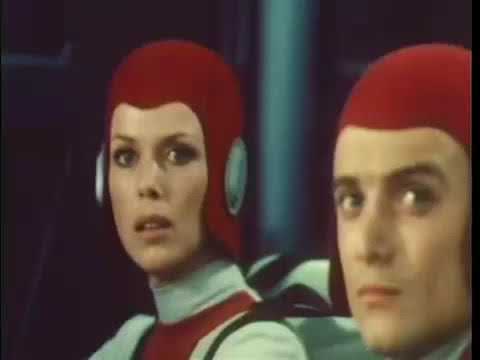Heat.
A burst of radiation, actually, signaling the beginning phase of what would grow into a stellar flare, but that’s what my sensors translated it as. A warning that the sector my ship had just passed through was becoming dangerous for both ships and life forms.
A token in memory of what I’d once been.
Other memories: A different heat. Laser heat, aimed at my one-man scout by a Spican corsair. Memories of the civil conflict, before all grievances were forgotten in the face of the alien challenge — the new war, against a non-human invader. Except I was no longer human either.
I’d been killed in the Spican’s ambush and, despite our worlds being allied now, that was a memory I’d never lose. The heat dissipated — all at once — as if it had been something only imagined. The last time I’d been a lot less lucky. I’d been killed in action, but my scout had held together just long enough to be recovered by one of my own side’s battle cruisers. The rest had been nightmare.
That heat had remained.
I checked my scanners, fore and aft. The mid-ship visuals. The infra-redders. Loosed the sono-robs from their booms. I even smelled the space ahead of me and was rewarded. The trail I picked up was faint, but, to me, could not be mistaken. Goranhauf’s spoor.
My hunch had paid off. For nearly five years since my recommissioning, I’d cruised the sectors that life-manned ships preferred to avoid. The dangerous sectors, that robo-merchants would sometimes sneak through, or occasional privateers like mine, whether manned or unmanned. But I’d had a mission beyond the one that FleetCen gave me, ever since I’d scanned the roster of similar semi-independents and learned that Goranhauf had been classed as a privateer too.
I’d wondered why. He hadn’t volunteered — none of us had, even back during the civil wars. Even before the colonial navies had reformed under FleetCen’s umbrella, the general idea was that those without money or social connections — in other words, ninety percent of those who did the actual fighting — were simply “classed” into whatever part of the fleet the admirals felt needed help most. Goranhauf, at the time we first met, had been classed as a picket by his own side. He’d been given a single-manned ship, one better gunned as it turned out than mine, and then set to ambush scouts like me.
The visi-comp pinged. The trail was fresher. I took a sonic reading over a wedge of space off my starboard bow, then ordered a full-power magnification of what the visual computer had seen.
A sickle-winged shape, its velvet black finish blending smoothly into the darkness that lay around it. Goranhauf’s corsair — then picket, now privateer — in any guise, a shape I’d first seen only when it flashed out at me, guns blazing death, giving me scarcely a chance to return fire before my shattered scout was sent spinning back to my own side.
“Identify!”
Goranhauf’s challenge. Again he’d seen me first, reacted first. But we, allegedly, fought for the same cause in this new war.
“FleetCen XX-2,” I answered. “Armed and on patrol under letters of marque. Identify back — visual ID. Is that you, Goranhauf?”
Minutes passed. We were that far apart, even as our ships were closing. “Identify — visual,” I repeated, knowing he had probably already sent his compliance. “I’ve trailed you, Goranhauf, and, if it’s you, there’s nothing that you can do to hide.” As I finished the words, my internal screen flashed into an image of a heavy-faced, black-bearded man.
“This is Goranhauf” — we were still closing — “I . . . geeze, are you really an early double-X? I’d heard that most of them had been destroyed.”
“My name is Metler,” I replied. “Alan Metler. Perhaps you remember, when you fought for Spica. . . .”
The time lag that separated our messages and replies was getting shorter. Nevertheless, there was still a delay.
“I . . . why would I hide?”
Why would he hide from me? For the same reason that most of the early XX conversions had been destroyed. Pain was the reason, when it came down to it. Searing pain.
I switched on my own visual ID transmitter, knowing that all he’d see was a network of wires and tubing. The pain hadn’t stopped when my ship had been rescued, but only started. My combat record had been good enough for me to be given a second chance, so, just as my nerves were flayed from what was left of my body, my brain was revived.
“Because I intend to kill you, Goranhauf, just like you killed me.”
“But you survived, Metler. The process worked for you. You’re one of the few. . . .”
The memory of survival was agony, without cessation. This was survival: Nerves cut from flesh, then spliced into circuits; eyes, ears, tongue, skin, every external part fused with sensors; spinal ganglia, locked in tungsten, laid as vertebrae into a new keel. And, after, the testing in which lay the real pain as we became one, my scout ship and I, in movement and will, while most of the others did not survive. The others, who underwent the conversion, as Goranhauf said, had been destroyed — as an act of mercy. But, even with the worst of the failures, mercy came only after they’d been kept and tested long enough for FleetCen to learn how to make today’s man-ship conversions easy.
“Yes, Goranhauf,” I said. “I survived.”
This time I fired first, in the moment he waited to hear my reply. Heat beams and words struck his ship together.
“Metler, for Christ’s sake! We’re on the same side. We could be partners. We could forget what happened before and work together.”
I fired again as our ships flashed by. “You were the one who did this to me, Goranhauf. Made me survive on hatred alone — on what I would do when I finally tracked you. When I was recommissioned, they made me a privateer because they didn’t know whether a ship like me could operate in concert with others. They may have been wise. In any event, they did me a favor by giving me the freedom to search. . . .”
He checked speed and circled — instead of running, he intended to meet my challenge. There wasn’t time for talk after that, or even for thinking. I’d managed to damage his ship on that first pass, but only lightly, and now he came back with his forward lasers crackling on tight beam.
I fired again — didn’t know if I hit him — felt the pain as his first blast struck me. Screamed with the agony, shrieking, silently, out to the stars as I disengaged. This time the holes were burned in my own skin.
“Surrender, Metler,” my com-circuits screamed back. Goranhauf’s ship turned, as if the battle were over already, to finish me off. “I’m a better gunner than you are — even if you’re joined with your ship, I always will be. But we should be partners. Metler, listen, I wish you would at least consider. . . .”
I switched my voice receiver off. I thought of the stars. I thought of one star in particular, one that I knew was about to flare. I watched as Goranhauf’s ship fired again, but this time I took evasive action.
I made him chase me.
I kept him busy, turning, evading, scoring an occasional hit as I drew him with me, doubling back on my earlier course. I began to feel a warmth from the star, then a streak of searing heat arcing out toward our path. I took hits as well — it wouldn’t be long until I was crippled. Nevertheless, in spite of the pain, I made sure I kept him busy enough that, with his reliance on his ship’s separate warning circuits, he wouldn’t guess where the real danger lay until I was ready.
I flew with pain, but I’d felt it before, and enough that was worse that I’d long ago realized that permanent death was something I wanted more than life. Permanent death, but a death with completion — I wanted a death, if it had to come now, that took Goranhauf with me.
I made a last distance and course calculation, then hit my retros, sliding into a spiraling turn that took me below him. I watched as he flashed past — even when he’d killed me before, had it not been for the speed of his ambush, I would have proven the better pilot. I listened — tasted the chemical flame — as he tried to brake into his own sliding turn, then desperately fired his stern blister cannon as soon as he realized I’d switched back to full forward thrusting power.
All he could do was to fire and fire again, riddling my body, helpless to stop me . . .
#
. . . to take the blow as my torn ship rammed . . .
#
. . . to accept my embrace as, together, we swept into agonized brightness. Brightness and darkness. Into the flare. . . .
#
And then brightness again.
My ocular sensors felt different this time — the fixed scanners covered a wider angle. I tested my nerve circuits, flexed my thrusters, realized that the conversion process was easier now.
They’d done it again — FleetCen had built me into a larger, newer vessel, without my even realizing they’d done so. I tried to change course, this time to seek out not just a stellar flare, but a star’s center to drive myself into. I felt resistance. I struggled against it. I felt an opening.
My mind fell through.
Goranhauf! I didn’t have voice circuits. Yet, at the same time, I didn’t need them.
You killed me, Metler. You got what you wanted. But FleetCen found us, just like your side’s navy found you the last time.
I tried to close my ears to what he said, but couldn’t do it. It wasn’t a sound. Then leave me, Goranhauf, I tried to scream — it wasn’t a sound, but something I heard within my own mind. Even if you’ve been converted as well. I’ll accept that, if you’ll accept that I got what I wanted and leave me alone.
I wish I could, Metler. But you were killed too. FleetCen has our records, the transcripts detailing your skills as a pilot and mine as a gunner, and, when they found our ships crushed together, it gave them an idea. We’ve both been rebuilt . . .
I heard Goranhauf’s laughter — it wasn’t a sound, but something a lot worse — then heard the laughter rise up to a scream. I joined it with mine as, a moment later, his words continued.
. . . rebuilt, Alan Metler, into the same ship. Welcome aboard what, once it’s passed testing, is going to be FleetCen’s newest weapon — the first double-X-class two-man destroyer.
END.
By James Dorr
James Dorr’s latest book is a novel-in-stories published by Elder Signs Press in June 2017, TOMBS: A CHRONICLE OF LATTER-DAY TIMES OF EARTH, while his THE TEARS OF ISIS was a 2014 Bram Stoker Award® nominee for Fiction Collection. Other books include STRANGE MISTRESSES: TALES OF WONDER AND ROMANCE, DARKER LOVES: TALES OF MYSTERY AND REGRET, and his all-poetry VAMPS (A RETROSPECTIVE). A mostly short fiction writer and poet working mainly in dark fantasy and horror with some excursions into mystery and science fiction, Dorr invites readers to visit his blog at http://jamesdorrwriter.wordpress.com.

